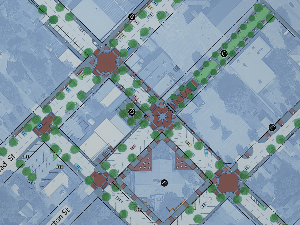How to Choose a Location for Your Business
In real estate, location is everything. For prospective or current homeowners, the home’s location has a direct impact on its value. For business owners, location is equally important. Regardless of whether you’re starting a new business, or moving or expanding an existing one, there are many factors to consider when choosing a location.
Analyze Demographics
Cedar Hill EDC has compiled the demographic data you need to have before deciding on a location for your business.
Does or will your business appeal to locals in the community?
Cedar Hill has over 1,300 local businesses and service providers. The success of these establishments is a testimony to their appeal to the city’s residents.
Does the community have a stable economy?
The labor force in Cedar Hill consists of 26,456 individuals. The city’s population is 49,197. The city’s unemployment rate is 3.6 %, and as of December 2017, the nationwide unemployment rate is 4.1%. People are drawn to Cedar Hill because of the quality of life it offers. Having a community of people who live and work in the same place creates greater economic stability.
Will you be able to find employees who have the skills your business requires in the community?
Cedar Hill is situated in a rapidly growing area. Regional workforce of over 1 million within a 30-minute drivetime allows companies to access a wide variety of talent to meet labor force needs.
Will you and the people you hope to hire be able to find affordable housing in the community you’re considering for your business?
Cedar Hill has a range of home styles at different price points. In 2015, the average home value was $145,613. Although the city consists mainly of single-family homes, rental units are also available.
Entrepreneur writer Karen E. Spaeder encourages business owners to learn about anything that might generate traffic in the neighborhood. That can include everything from retail shops to hospitals, industrial or office parks, colleges, K-12 schools, malls, restaurants, cultural activities, and community centers and parks.
Assess Your Business Needs
According to the Small Business Administration, the location a small business owner or startup company chooses is arguably the most critical decision they will make. Keep these tips in mind as you look at potential properties.
Branding
Every business is its own brand. Think about each potential location and how it will reflect on your brand’s image - whether you’re trying to develop an image for your new business or trying to maintain its established image.
What About Competition from Other Businesses?
Competition can be good and bad. Entrepreneur cites the advice of Greg Kahn, the CEO and founder of the Kahn Research Group in Huntersville, N.C. He says, “Quite simply, the best place to be is as close to your biggest competitor as you can be.” It may sound crazy, but his point is that your competition already did the necessary demographic research before they chose that location, so it makes sense to take advantage of the data they acquired.
Find out if your competition is spending money on advertising. Take advantage of the fact that their advertising is attracting customers. Consumers look for bargains when they shop, and the availability of more stores or restaurants in an established area gives them more choices.
Click here to learn more about the abundance of business opportunities and growth potential in Cedar Hill, or contact us for more information.




